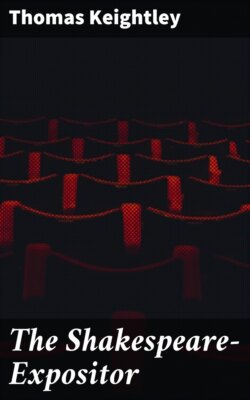Читать книгу The Shakespeare-Expositor - Thomas Keightley - Страница 64
На сайте Литреса книга снята с продажи.
17.
ОглавлениеI will now make a few general observations on the dramatic verse of Shakespeare and his contemporaries. In the first place, as observed above, we may lay it down as a general rule that their verse—I may perhaps include even that of Marston—is never rugged or inharmonious, but that when it appears to be so it is owing to the copyist or the printer, or to the fact of the manuscript having been damaged, and not unfrequently to want of skill in the reader.
An apparent cause of imperfection in lines is the reader's ignorance of the poet's mode of pronunciation. Thus it was then the custom—one not quite lost yet—in prose as well as in verse, if two words came together, one ending, the other beginning, with an accented syllable to throw back the former accent: hence Shakespeare said, for example, "the dívine Desdemona." If critics kept this fact in mind, they would not reject Tieck's excellent emendation of "the précise Angelo" for "the prenzic Angelo" in Measure for Measure, on account of the accent, when in the very same play we have "a cómplete bosom," i. 4; "O just, but sévere law!" ii. 2; "Will bélieve this," ib.; "Our cómpell'd sins," ib. 4, &c.; we have actually "précise villains," ii. 1. How would they read
Might córrupt minds procure knaves as corrupt
(Hen. VIII. v. 1)?
In fine, it must be remembered that ion, ien, and other double vowels were pronounced dissyllabically, as oceän, &c.
Again, neither editors nor readers are in general aware that poets like Shakespeare, who were born in those parts of England where the r at the end of words or syllables has the light sound peculiar to the English language, frequently pronounce as dissyllables those monosyllables, such as fire, hour, more, where, &c., ending in r after a long vowel or diphthong, as in
I know a bank, where the wild thyme blows.—M. N. D. ii. 1.
Here "where" is to be pronounced nearly wheaa; for so the English really do pronounce it, though they may fancy such not to be the case. Malone, as being an Irishman, seems to have been the first to notice it. Of these monosyllables there are upwards of thirty in Shakespeare, and as many in Fletcher; while in the learned Jonson we only meet with fire, hour, our, your, wear. In my Edition, and in this work, I have marked them with a diæresis, as whëre, heär, &c. It is rather remarkable that it is almost solely to his higher characters, such as Hamlet and Coriolanus, that Shakespeare gives this pronunciation. We also find this dissyllabic pronunciation in such words as born, morn, horn, &c.
As in French poetry the e muet in words forms a distinct syllable, ennemi, for example, being read as a trisyllable; so we find angry, entrance, children, mistress (often written misteris), country, witness, juggler, wondrous, &c., forming three, remembrance four syllables. Captain was sometimes capitain, as in French. Many of these cases, we may observe, are mere solutions of contractions, angry, for example, being simply angery contracted.
